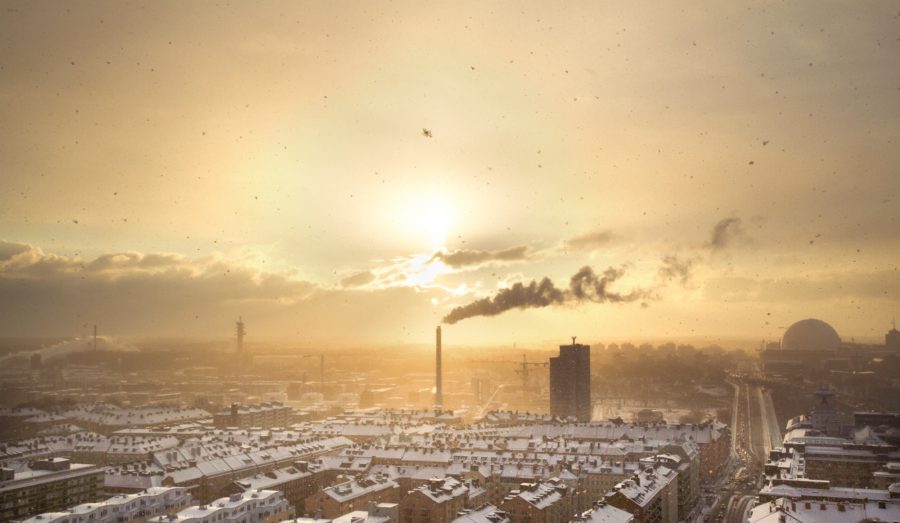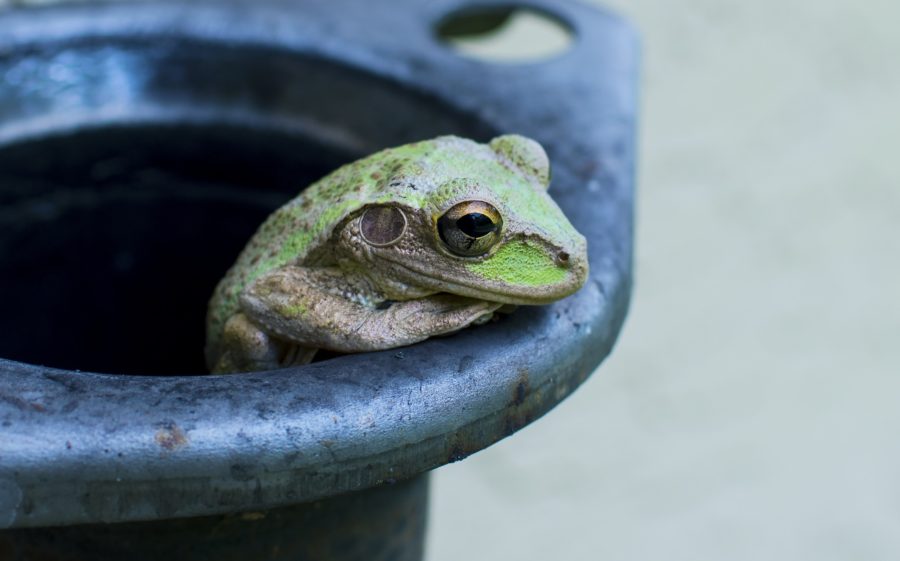Welcome to this three-part blog series exploring the psychology behind humanity’s response to the global threat of climate change. Part one introduces the central role psychology plays in our response to climate change and explores the influences of evolutionary biology. Part two takes a clear look at the real and urgent threat climate change presents. Part three presents a road map for not only how to use this understanding of human nature to avert a crisis, but also how we can take advantage of the opportunity climate change presents in order to transform our relationship with each other and the natural world.
I must admit, writing this series has not been an easy task. I’ve had to face my own resistance to accepting the daunting reality of climate change and in doing so shoulder some personal responsibility for becoming part of the solution. An impending threat to humanity is overwhelming and not an easy thing to face. I’ve had to ask myself many times, “While our very world hangs in the balance, will you stand up and fight or will you keep your head in the sand?” Now more days than not it is “Yes, I will stand” but it is still easy to slip into hopelessness, especially when feeling isolated. This is one reason why I wrote this series. Only when enough of us lock arms in steadfast resolution will we become a powerful enough force to turn the tides on protecting our planet. And time is running out. May my words help you to think and feel deeply about how we are impacting our planet and inspire you reach out to another and take part in the incredible opportunity this global threat presents for transforming our world.
“Common threats lead to common ground” ~ Jonathan Haidt
It Began With The Science Guy
I was recently thumbing through the entertainment options on a long overseas flight and came across a National Geographic special titled Bill Nye’s Global Meltdown. “Hmmmmm that sounds a little melodramatic and depressing,” I thought to myself. I didn’t really want to watch it. Climate change is an overwhelming topic that usually makes me feel powerless, stressed out and just generally unhappy. “But I have 8 hours with literally nothing to do” I thought, “Do I really want to watch superhero movies the whole time?” And so, I reluctantly decided to watch, for “educational purposes.”
From Environmental Activist to Psychotherapist
It wasn’t always this way for me, stressed out about climate change and the fate of the world and seeking escape in denial. At age 16 I was bright-eyed and full of enthusiasm for the environmental cause. My brother had terrible asthma as a kid and after learning that our beautiful mountain town was full of asthma-causing air pollution from several nearby states’ dirty coal power plants, I decided “something has to be done about this!” I researched who was working on an effective solution and began volunteering for a local environmental nonprofit that was involved in getting our home state’s 14 coal fired power plants cleaned up so we could take legal action against others. I remember sitting down at the first meeting and looking around at a room full of people at least twice my age. Everyone looked surprised by my attendance, but they welcomed me nonetheless. And you know what? Six months later the historic Clean Smokestacks Act passed in North Carolina.
Full of the confidence from this clear-cut “win” I jumped wholeheartedly into the environmental movement with my sights set on the big one, climate change. I went to Prescott College to study environmental sciences and conservation biology and I wrote broad sweeping philosophical essays that addressed questions like whether humanity has evolved enough morally as a species to wield a free energy source like the theoretical Cold Fusion. I also explored the positive potential a global threat like climate change might have. I believed climate change had the potential to bring humanity together and create a shift in identity toward global citizenry and a more harmonious relationship with the natural world. However, as soon as I got into the field professionally I witnessed a lot of squabbling within the environmental community and I became increasingly disenchanted. Humans are complicated and as it turns out, and the solutions weren’t as simple as following the best science. I eventually found my way to psychology, which I believed more directly addressed the problem; humanity’s propensity to act out of fear, greed, ignorance and anger and our inability to deeply consider the potential long-term consequences of our actions. For many years I narrowed things down and focused on understanding and helping to relieve the suffering within me and within the individuals right in front of me. I continued to stay involved with concerns for our planet and the many species inhabiting it. I called legislators and tried to keep my environmental impact to a minimum, but as time went on I began to feel more and more frustrated and hopeless about the whole situation.
I didn’t feel like I was doing enough but felt powerless and clueless as to how to do more.
Nowadays I find myself increasingly being called back to my original purpose; to help humanity come together to fight the common threat of climate change and in doing so foster an evolutionary leap in consciousness. The leap I am speaking of is not some metaphysical woowoo ideology. No, what I am speaking of is the simple shift in identity from nationality, race, and culture first to human first. In many parts of the world we have moved from tribal loyalties to include cities, states, and nations. The leap I speak of simply includes the inclusion of a global human identity, the acknowledgement that what we share and what unites us is far greater than our differences. In a world that seems to be sliding back into division, separation, and blame. We need this more than ever now. The awareness created from the moon landing, that our precious little blue planet floating in the harsh desert of space is all we have, was perhaps the first seed planted in this global human-centric identity. This shift must also include an awareness and acknowledgment of the limitations of the natural resources of our precious planet and a willingness to live in harmony with the natural world. It’s a lofty goal I know, but climate change is a truly massive crisis facing humanity and a fundamental shift in how we view the world and our place in it might just be the only way through this one.
Now back to the plane, where we find me reluctantly embracing the call to action in the form of a Bill Nye documentary . . .
It’s All About Psychology
After watching the documentary, I noticed a funny feeling. It was almost as if I was excited. “But why would I be excited about the climate change crisis? That’s weird,” I thought. Then I realized it was simply energy; energy pushing me towards action.
What I thought was new and smart about Global Meltdown was its attempt to incorporate psychology into the issue of climate change. How could the study of the human mind, how and why we do what we do and feel what we feel, not be central to the climate change discussion? In Global Meltdown Mr. Nye uses Elizabeth Kubler-Ross’s Five Stages of Grief model as a framework for understanding the way humanity is dealing with the increasingly robust and alarming scientific data supporting human caused climate change. Playing Bill’s therapist, Arnold Schwarzenegger helps guide him through all five stages of grief including:
- Denial
- Anger
- Bargaining
- Depression
- Acceptance
Within this grief model, denial involves resisting the reality of the loss/change and acting as if it had not occurred. In denial we simply go about our business like nothing has happened. Anger arises as a natural response to facing some of the reality of the loss/change that we don’t like. We get angry and say “How can this be?!” Bargaining includes the ways in which we want to make it not as bad as it really is. When we think about what we or others could have done to avoid the loss/change and how wonderful it would be if it didn’t happen, are ways in which we bargain. Depression occurs when our attention is able to move back into the present and feelings of emptiness arise. We feel the loss at a deeper level here. Acceptance arises when we begin to acknowledge and feel the new reality of the loss/change, and though we may not like it, are able to accept the loss as it truly is. It is helpful to think of these “stages” not as a linear process, at the end of which grief is somehow complete, but instead as five components of the natural and healthy grieving process that we continue to revisit over time.
Grief and Climate Change
So, what is it that we are grieving exactly when it comes to climate change? Though we have not lost the habitability of our planet . . yet, we are losing it in pieces as large swaths of natural life sustaining ecosystems perish and biodiversity disappears at record rates. This is a complex grief similar to what one might experience with a parent who has Alzheimer’s disease—loss in stages. We are also losing our connection with nature and the wildness of untamed lands we evolved with, which many within the field of Ecopsychology believe to be a very deep and damaging loss. Another loss/change that people may not be aware of is the luxury of being able to keep our focus on our own lives, family, and friends. Climate change is asking us to widen our sphere of empathy and concern out to the entire world and participate in matters that affect us all. We may wish to ignore this call to a wider sphere of thought and concern, but we do so at our own peril. Though the stages of grief may only explain a piece of our response to climate change, it is a good beginning. We must continue to explore, with a sense of urgency, the psychology behind why we aren’t doing enough to deal with climate change and use this information to plan an effective path out of this global crisis.
The idea of including psychology in the climate change dialogue may sound like a no brainer, but most information on climate change seems to focus on the science and the debate of its very reality. The science is overwhelmingly in support of the reality of human caused climate change. The debate is not helpful, and it serves as a distraction to the real issue at hand–solving the crisis. However destructive, the debate over the existence of human-made climate change is an indicator of where we are likely stuck in the five stages of grief, at number one—denial. As demonstrated time and time again in our elections, facts aren’t what motivate people to act, feelings are.
The reason we aren’t addressing climate change adequately isn’t because we are lacking in facts or even solutions, it’s a lack of political will and public motivation and understanding.
In other words, it’s all about psychology. For example, most of the people in power in our country right now, the baby boomer’s, grew up in our earth’s greatest time of plenty. They do not seem to be able to adequately conceive of the idea of things falling apart on a global scale, because they have never experienced it. The great depression era folks remember a time when there was not enough, but they are no longer calling the shots. Unfortunately, we do not have time to wait 20 years for a new generation of leaders and politicians to emerge. It has to happen now.
Reframing the Facts
Why are all the scientists studying climate change seem so depressed and exasperated? Because the mass reaction of denial doesn’t make sense to most of them. The Coral Reef biologist Ove Hoegh-Guldberg sums up the sentiment of most climate scientists well:
“However hard we try to get people to listen, it seems to be lost in the wind.”
I believe this is because most of the people trying to warn the world are well intentioned scientists using the same fact based logical arguments that won them over, and that’s not what’s going to work. What is needed right now is translation. We need people that can take all the facts and reframe them into concepts and arguments that speak directly to the moral values of many different groups within the general public. This concept is called Moral Reframing and is incredibly effective at helping people from different ideological backgrounds understand the issues as it pertains to them, and thus hopefully see it in a new light (For an in depth discussion of this topic see Robb Miller’s insightful Ted Talk). The more moral reframing we can do around climate change the better.
Using Anger Skillfully
If the urgency and severity of the climate crisis were successfully communicated and seen, we might as a nation successfully move from denial into anger (stage two). Though anger gets a bad rap most of the time, in its purest form it actually helps us to create healthy boundaries and stand up for ourselves and others in order to fight for what is right. If we could allow in the reality of climate change a little more and get angry, we could move all the way to accepting the reality and magnitude of the threat of climate change. Righteous anger could bring people of all walks of life together to face this reality and do something about it. If we allowed ourselves to face this reality do you think we would still be the only nation on earth that has not signed the Paris Agreement? I think not. Our nation, and even the world, could come together and mobilize like we did during World War II against the common world wide threat of the Nazi regime. And, make no mistake here, climate change does pose a potential threat on par with or greater than Nazi Germany during WWII. Nothing brings people together more than a common threat. In his very insightful Ted Talk, the social psychologist Jonathan Haidt states that, “Common threats lead to common ground.” This is the opportunity climate change presents.
Imagine if suddenly a patient alien race showed up and said “We are going to heat up your planet over the next 100 years until it becomes uninhabitable for you, but just right for us, and then move in.” What do you think would happen? I have no doubt we would spring into action and work together to do everything we could to preserve the human race and the planet we live on. However, the threat of climate change is internal and because of this the clarity and urgency is more easily obscured in a cloud of confusion by those that stand to gain from maintaining the status quo. These power players have discovered the very effective strategy of taking advantage of ideologically divides to pit people against one another instead of uniting to dealing with the universal crisis at hand.
If the majority of us mobilized, we would be able to steer clear of the cliff. We have the means right now–money, technology, power. However, we are as a nation stuck firmly in denial and squabbling along party lines, as if the habitability of our planet were a partisan issue. Meanwhile, the world heats up around us pushing us toward an ecosystem breakdown boiling point. This leaves the majority of Americans feeling isolated and overwhelmed by climate change and my guess is that like myself, often feeling powerless and at a loss as to what meaningful actions to take.
It makes sense that it’s overwhelming. Has there ever been so many global threats rearing their heads at once in human history? An antibacterial resistant pandemic, the creation of an unchecked true Artificial Intelligence and the singularity, the end of fossil fuels and resulting collapse of the world economy, and of course nuclear war, just to name a few. However, we have to remember that not acting, especially in the case of climate change, is acting. Climate change is already happening, simply by living in a modernized world we are a part of the problem, and if we do not act it will continue to barrel down on us with no care for the world’s collective regret. However, our current complacency dilemma can in part be traced back to one of our greatest survival strategies—adaptability.
The Adaptability Problem
We’ve all heard about the frog placed in hot water that jumps out immediately, but slowly turn up the heat and . . . the frog boils. This phenomenon seems to originate out of a series of experiments done in the late 19th century, and has been used as an analogy for the complacency of humans during social changes that take place over a long enough period of time with slow enough changes. Though there is actually some controversy regarding the original experiment’s validity, the boiling frog analogy has psychological significance and has already been used by environmental activists, like Al Gore, to try and explain our lack of action as a planet in addressing the dangers of climate change.
Regardless of whether frogs are smarter than humans when it comes to things heating up, I believe the basic tenants hold up. Our ability to adapt to new circumstances, specifically new climates, has been one of our biggest evolutionary asset as a species. An article in the Scientific American states that,
“Our adaptive ability not only allowed our progenitors to ride the massive seesaws of climate shifts but subsequently helped them to colonize new habitats.”
We are very good at getting used to the new “normal” and going about our lives, which up to this point has served us well. For a current example, look no further than the unprecedented speed at which technology is changing our lives and how we are quickly adapting to the new norms of constant contact.
In evolutionary biology, something that helps an individual or a species survive is called an adaptation, and something that hurts an individual or species survival is called a maladaptation. Though our adaptability has been our biggest asset for the entirety of our species, our adaptability to our shifting environment is now hurting us more than it is helping us. If we continue adapting to a changing climate of our own making, as our ancestors have done, it will soon become a disastrous maladaptation.
Though our climate adaptability is still firmly rooted in our evolutionary hardwiring, we can and must take an evolutionary leap in consciousness and choose a different path. If we are to effectively address the unprecedented threat of climate change, we have to update the software of our ancient brains. We must consciously use our brain’s capacity for critical thinking to learn from past mistakes and teach new ways of relating to the natural world and each other that take into account our impact on earth’s natural systems.
May we not be too late.
Part Two
Thank you for reading part one of the Psychology of Climate Change blog series. If you are ready for part two, which focuses in on the clear and present danger of runaway climate change, click here. Please stay tuned for part three, which focuses on how to turn crisis into opportunity.






